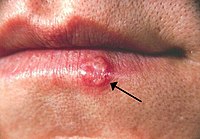
Photo from wikipedia
Frailty is an emerging geriatric syndrome characterized by decreased physiologic reserve and increased vulnerability to environmental factors. Several studies have examined the association between persistent cytomegalovirus (CMV) infection and poor… Click to show full abstract
Frailty is an emerging geriatric syndrome characterized by decreased physiologic reserve and increased vulnerability to environmental factors. Several studies have examined the association between persistent cytomegalovirus (CMV) infection and poor clinical outcomes in the elderly, but the results are often contradictory. Here, we performed a systematic review and meta-analysis to analyze the association between human herpesvirus seropositivity [CMV, Epstein-Barr virus (EBV), Varicella zoster virus (VZV), and Herpes simplex virus (HSV)] and frailty in elderly people. Searches were performed in PubMed, SCOPUS, Lilacs, IBECS, and Web of Science databases. We used the odds ratio (OR) as a measure of the association between herpesvirus infections and frailty. Summary estimates were calculated using random-effects models. Six studies were included in the present systematic review. The data from 2559 elderly subjects were analyzed; 1571 of the subjects had ages between 60 and 79 years, and 988 of the subjects were older than 80. We found an association between CMV seropositivity and frailty in the elderly aged 60-79 years (OR 2.33, CI 95% 1.48-3.67) but not in the oldest-old subjects (OR 0.67, CI 95% 0.42-1.05). Moreover, no association was found between EBV, VZV, and HSV infections and frailty. Current evidence suggests an association between CMV seropositivity and frailty in individuals aged 60-79 years old.
Journal Title: Ageing Research Reviews
Year Published: 2018
Link to full text (if available)
Share on Social Media: Sign Up to like & get
recommendations!